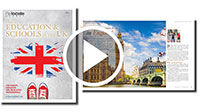What makes a truly great school?
Is there such thing as a ‘perfect’ school? Sir Anthony Seldon, historian, political commentator and author, addressed the impossible question at the Independent Schools Show in London, counselling parents to put a child's wellbeing at the heart of any choice.

Private schools: greedy and insular?
“There is a misconception that private schools are greedy and insular, lacking in goodwill towards anyone outside the system, but this couldn’t be farther from the truth,” he said in opening.“If we look at some of the statistics from World War 1, between 10-11% of those who joined the army were killed in action.“If you look at the statistics for those who went to independent schools, that figure rises to 20%: one fifth of those who signed up for the army from independent schools were killed in action.”Why are these statistics so different? Mr Seldon believes that one of the most important parts of an independent education is the development of character and the emphasis on serving others. For children who are boarding, they learn to live in a community, care for others, work together in a team and to share responsibilities.“It is important to remember this when we think about independent schools and their purpose,” he said.Relocate Global's Guide to Education & Schools in the UK 2018 is full of advice on private and state schooling in the UK. Access your free digital copy here.
What should a school look like?
A question from the audience invited Mr Seldon to share what he would do if he started a school from scratch.“Our schools are full of people wanting to do their best,” said Mr Seldon, “but we have lost touch with what education really means.“It has become all about mark maximisation for league tables. I’m not saying that exams aren’t important but that education is not just about exams.”“Every year one third of children fail to meet the government’s requirements for what it means to be successful at GCSE. I would not design an education system where one third of children are set up to be failures.”Network, learn from global leaders and develop ideas and solutions to global mobility challenges at our interactive the Festival of Global People 2019 on Tue 14- Wed 15th of May
Enter the Think Relocate Awards 2019 to showcase your company’s achievements across the mobility sector
Pressure on children to succeed
Mr Seldon, a strong proponent of the International Baccalaureate (IB), went on to discuss the pressures on children to perform in exams and the resulting feeling of failure if they don’t succeed.“Parents often prioritise exam results over the mental health of their children,” he said, referring to recent figures from the World Health Organization, which showed that 35% of students starting university reported a mental health issue.“What matters is the child: who they are and who they want to be. You cannot inflict your own aspirations on them.”He referred to American psychologist, Professor Howard Gardner, creator of the theory of multiple intelligence who said, “Don’t ask how intelligent a child is: ask how they are intelligent.”“All children are unique and have something of value to add,” said Mr Seldon. “We should be educating people’s hearts, bodies and souls, not just their minds. At the moment in schools we’re only interested in educating people’s minds – that’s why arts education is in decline.”In finishing Mr Seldon said that parents must teach their children resilience – to bounce back from failures and to learn from them, having confidence in their own abilities. “If a child doesn’t learn to accept themselves how they are – their strengths and their weaknesses – then you are setting them up to fail. Accepting that you have done your best, that is wisdom.”For more from the Independent Schools Show, see How can we help children to become digital ninjas?
The Guide to Education & Schools in the UK is designed to help relocating parents make informed education choices. For volume options, co-branded editions, digital or online licence agreements and advertising opportunities, call Ali Pettitt on +44 (0)1892 891334 or email ali@relocatemagazine.com For more education and school related news, visit our Education and Schools pages.Access hundreds of global services and suppliers in our Online Directory
©2026 Re:locate magazine, published by Profile Locations, Spray Hill, Hastings Road, Lamberhurst, Kent TN3 8JB. All rights reserved. This publication (or any part thereof) may not be reproduced in any form without the prior written permission of Profile Locations. Profile Locations accepts no liability for the accuracy of the contents or any opinions expressed herein.































